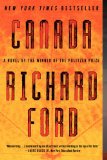Summary | Excerpt | Reading Guide | Reviews | Beyond the book | Read-Alikes | Genres & Themes | Author Bio

A Novel
by Howard NormanNear the end of What Is Left the Daughter, the narrator, Wyatt Hillyer, reflects, "I never believed in the phrase 'it all comes back to me now,' because not all of anything that happened in the past comes back whole cloth." The attempt to reconstruct, understand, and, to a large extent, rationalize the past forms the fascinating subtext of Wyatt's narrative in Norman's tightly crafted novel of love, loss, and wartime.
Like many of Norman's other novels, the protagonist's story begins with a tragedy, when seventeen-year-old Wyatt is orphaned in dramatic fashion in 1941. Forced to start over in the wake of this infamous incident, the young man travels to the small Nova Scotia town of Middle Economy, where his aunt Constance and uncle Donald live. There Uncle Donald teaches Wyatt the trade of building toboggans while Wyatt gradually becomes part of small town life, ordering up coffee and conversation at the local bakery each morning and falling hopelessly, secretly in love with his cousin Tilda, Donald and Constance's adopted daughter.
Wyatt's love for Tilda, however, is blockaded by the arrival of Hans Mohring, a German student who was studying at Dalhousie University when war broke out, who takes a room above the bakery and with whom Tilda falls instantly in love. Meanwhile, Uncle Donald's increasing paranoia about the escalating events of World War II seems validated by the sinking of the Caribou, a Canadian ferry boat which may have been carrying his wife, by a German submarine. In the wake of this tragedy, Hans Mohring becomes the logical (at least to Donald) target of Donald's grief and anger, triggering a series of events that will shape the lives of Wyatt, Tilda, and their families for years to come.
Howard Norman is a master storyteller, packing provocative details into virtually every sentence of this short, but hardly slight, novel. Secondary characters, including the bakery owner, an aspiring stenographer, and a record collector, are depicted as quirky but utterly human. Likewise, the details of life in Middle Economy, including Tilda's aspirations to become a professional mourner, Donald's increasing obsessions, and Wyatt's attempt to master a craft, are simultaneously slightly off-kilter and completely sympathetic.
Wyatt narrates his story as a long letter to his daughter, Marlais, written more than twenty-five years after the sinking of the Caribou. The exact circumstances of Wyatt's separation from Marlais are revealed gradually, heartbreakingly, as Wyatt reveals—piecemeal, as his narrative suggests—the circumstances of Marlais's conception, birth, and childhood. Wyatt's abiding love for his daughter—love he has been almost entirely unable to express previously—comes through consistently and poignantly, as Wyatt tells his daughter about his life, warts and all. "All I had to leave you, really, is what I'm writing here," writes Wyatt before starting his letter. In effect, the novel's readers become stand-ins for Marlais reading the letter from her father. What is left the daughter--and the reader--here is the gift of one man's utterly human, heartbreaking life story.
![]() This review was originally published in The BookBrowse Review in July 2010, and has been updated for the
May 2011 edition.
Click here to go to this issue.
This review was originally published in The BookBrowse Review in July 2010, and has been updated for the
May 2011 edition.
Click here to go to this issue.

If you liked What Is Left the Daughter, try these:

by Richard Ford
Published 2013
A true masterwork of haunting and spectacular vision from one of our greatest writers, Canada is a profound novel of boundaries traversed, innocence lost and reconciled, and the mysterious and consoling bonds of family.

by Sarah Blake
Published 2011
The Postmistress is an unforgettable tale of the secrets we must bear, or bury. It is about what happens to love during wartime, when those we cherish leave. And how every story - of love or war - is about looking left when we should have been looking right.
Failure is the condiment that gives success its flavor
Click Here to find out who said this, as well as discovering other famous literary quotes!
Your guide toexceptional books
BookBrowse seeks out and recommends the best in contemporary fiction and nonfiction—books that not only engage and entertain but also deepen our understanding of ourselves and the world around us.